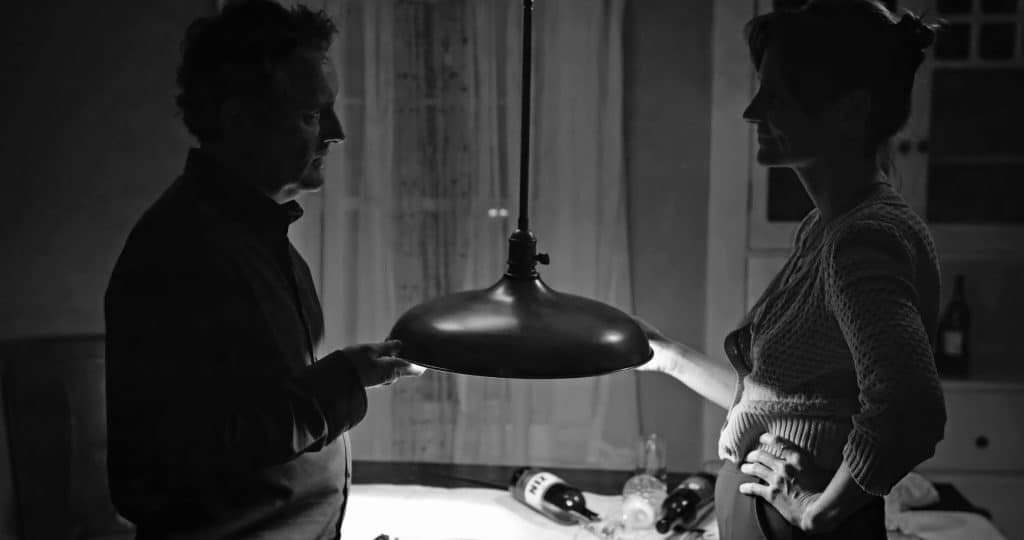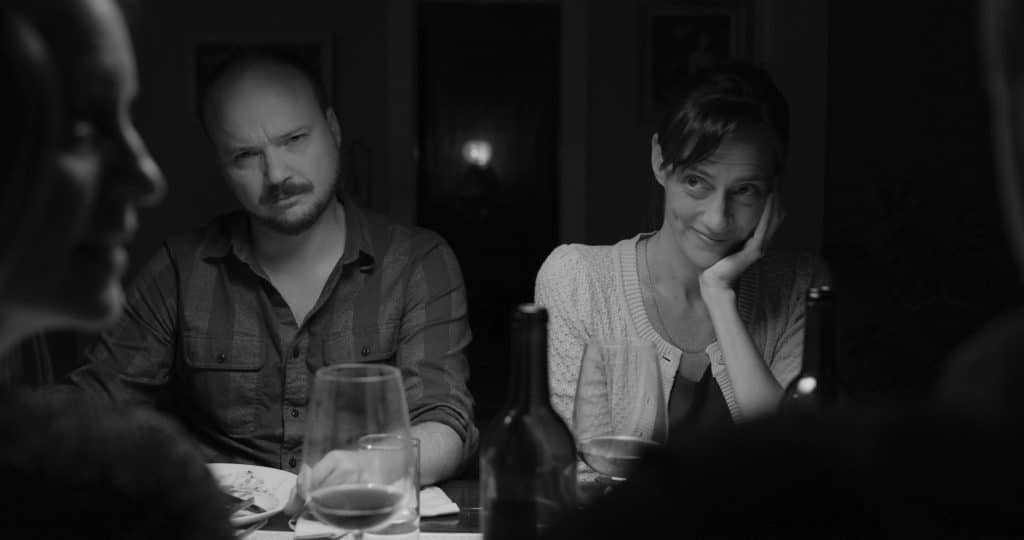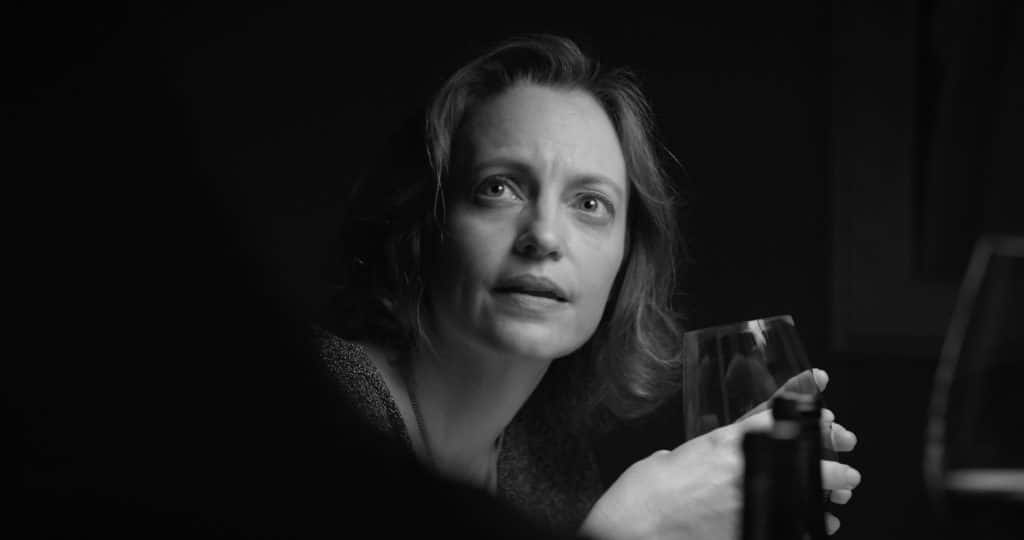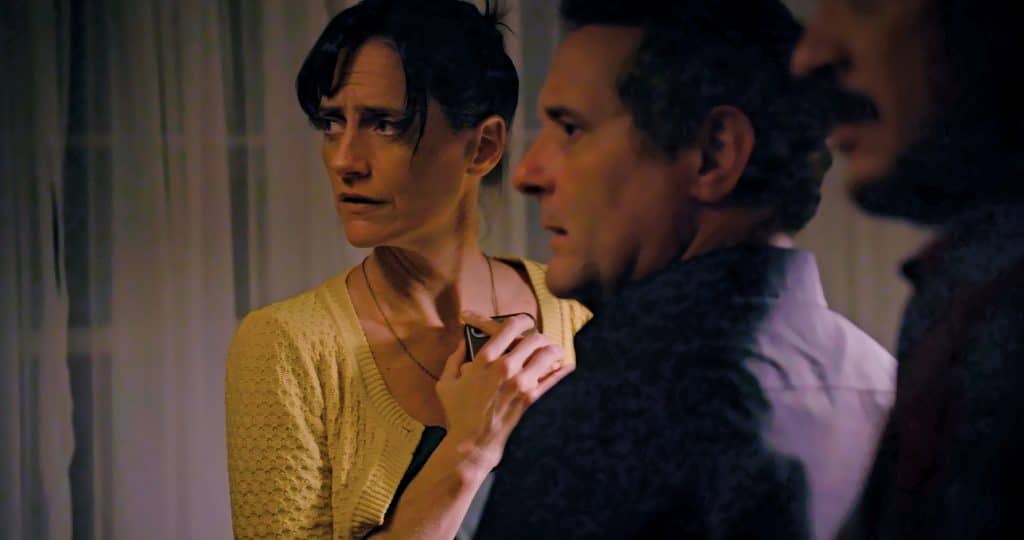Robert Kropf (Pierre) and Brenda Withers (Darlene) in Dindin
by Rebecca M. Alvin
Playwright Brenda Withers had never written a screenplay before when the decision was made to turn her play Dindin into a movie with her Harbor Stage Company co-founders Stacy Fischer, Robert Kropf, and Jonathan Fielding. The play is not an obvious choice for film adaptation as it is centered on four characters sitting around a dinner table and the action takes place primarily through the words spoken amongst them. But then again, anyone who has made an independent film before will tell you, a small cast of excellent actors and one or two sets, no explosions or car chases—that’s the formula for a microbudget indie film that just might have legs.
The impetus for making it into a film had more to do with the pandemic years than it did with any savvy independent filmmaking strategy, though. In 2020, no one went to live theater, and in 2021, when Dindin was produced, the Harbor Stage was not sure how many would venture out to see it. They did a Zoom reading of the play and then, before the play did eventually open on the stage in Wellfleet, they decided to make the film with filmmaker Brendan Patrick Hughes as their director.

“We’ve been so focused on the Harbor for so long that every year is a different climb, but it’s the same focus, and this really opened things up for us. If there is a silver lining to the pandemic for the Harbor Stage, it is that it inadvertently opened us up to new horizons and different kinds of experiments,” Withers says. “I’m certainly interested in continuing to learn about screenplay writing.”
Although the film is dialogue driven and confined to one room, basically, that doesn’t mean it isn’t cinematic. Cinematographer Emily Topper shot the film with moody lighting, amplifying the tensions that abound in the script, which features a couple, Pierre (Kropf) and Emily (Fischer) and the two friends they are trying to set up, Darlene (Withers) and Ricky (Fielding) having dinner together. As the conversation, and the wine, flows, the cracks in the couple’s relationship reveal themselves, as do the cracks in the friendships with their guests. Issues of class, morality, and integrity mix with the deeply personal elements of a strained marriage when Emily disappears and the intensity of the conversation amongst the remaining three escalates.
Darlene is a character that will be familiar to those who have seen Withers’ other plays. Like many of her lead characters, Darlene is someone with a passion for arguing over minute details, and a hatred of moral ambiguity and intellectual laziness. When asked if these characters reflect her own personality, Withers laughs in recognition of the part of herself that exists in Darlene and the others. But then again, isn’t that true for all fiction writers?

“In terms of characters being me, I tend to think of them all as me, because they’re all things I think. Even if I think they’re crazy thoughts, they still come through my head,” she explains. “And then when I realized that maybe it’s a nutty thing to say, that’s when I find that next character’s argument, you know? So, I definitely relate to Darlene, but I probably relate to them all at different times of the day.”
It’s also a hallmark of Withers’ writing that the characters reveal themselves through semantic arguments, coded language, and innuendo, but with the addition of that uniquely filmic tool—the close-up, the emotional nuance is more clearly visualized for us than it would be on the stage. There was also the decision to shoot largely in black and white and then change to color when things get real, something you can’t really do in theater but which works marvelously on film in this case. And while many stage actors struggle with the more subtle nature of film acting, under Hughes’ direction, this cast transitions seamlessly to the screen. Withers says the script really did not have to be adapted much because they were able to work with Hughes and Topper to stay true to the story in a visual way, despite what may at first have seemed like limitations of the material.
“We kind of settled on keeping as much of the script intact as possible and filming it like a chamber piece,” she says. And the confinement to a single set is not an obstacle but a tool to communicate what becomes a stifling and awkward situation “That’s sort of the point of the story is that they are trapped together. So, you don’t need to go outside that much, you don’t need to have a million shots in the kitchen, or on the doorstep. You can really center it around the table,” she adds.

The film, which was completed some time ago and had its premiere at the Cape Cinema in 2022, is about to reach a far larger audience as it becomes available on streaming platforms Apple TV and Amazon Prime on October 8. There are hopes for some local screenings eventually, perhaps at theaters rather than movie theaters, but nothing has been scheduled as of yet.
As for Withers, the Harbor Stage continues to be an amazing place for experimentation and creative freedom, not only as a playwright and director, but also as an actress. She finds satisfaction both in playing the roles she’s written for herself and also the roles written by other playwrights.
“I think I’d like to play something like really theatrical soon, like something really heightened, really strange, maybe an alien,” she muses. “Just something that is so different, that is a little bit outside of human psychology. And use that as a way to get into human psychology. I’d like to look at something like that.”
Dindin premieres October 8 on Apple TV and Amazon Prime. For more information about the film and the Harbor Stage Company, visit harborstage.org.
All images courtesy of Harbor Stage Company











